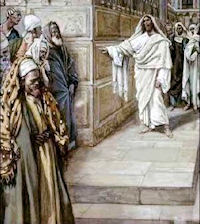“Let the children come to me.” (Mark 10:14)
In his apostolic letter introducing the coming Year of Faith, Pope Benedict XVI wrote that “faith commits every one of us to become a living sign of the presence of the Risen Lord in the world” (Porta Fidei, 15). So it’s no wonder that Jesus “became indignant” when his disciples, with good intentions, tried to keep people from bringing little children to him (Mark 10:14). Deciding who was worth Jesus’ time, the disciples weren’t being a “living sign” of God’s presence.
This wasn’t the first time the disciples did the wrong thing with deep sincerity. Peter tried to convince Jesus that he didn’t have to die (Matthew 16:22-23). James and John asked Jesus to reward their devotion with a privileged place in heaven (Mark 10:37). And Martha asked Jesus to make her sister help with the cleaning (Luke 10:40). And in each case, Jesus rebuked them and tried to set them on the right path.
The best part is that none of these people gave up. In fact, Peter probably received more rebukes than anyone else—but he ended up becoming the “rock” on which Jesus built his Church (Matthew 16:18)! They kept learning from their mistakes, and that made them all into bright signs of God’s presence.
We too will make “sincere” mistakes—if we haven’t already! We will say or do something that we think is helpful, but poses an obstacle in our lives or keeps someone else from drawing closer to the Lord. How encouraging it is, then, to remember that we’re in good company! Like them, we too can learn from our mistakes if we remain open.
The apostles loved Jesus—and so do we. Still, his ways are not always our ways. The good news is that Jesus wants to show us where we went wrong and encourage us to try again. So don’t give up. Jesus is with you, always helping you to become a living sign of God’s presence.
“Lord, I want to keep learning. Help me to keep an open heart.”
Genesis 2:18-24, Psalm 128:1-6, Hebrews 2:9-11
Questions for Reflection or Group Discussion
1. In the first reading, we hear that God’s plan for marriage, from all eternity, was a call to unity (“one flesh”) in love. This is a unity of teamwork and intimate personal relationship where deep emotions are shared and personal dignity is upheld. If you are married, what steps can you take to improve unity with your spouse, deepen your relationship, and deal better with anger or conflict? If you are not married, what steps can you take to improve unity and deepen your relationship with those you work with or those you are closest to?
2. In the Responsorial Psalm, the Lord promises blessings to those “who fear the Lord, who walk in his ways” (Psalm 128:1). What do you think it means to walk in the Lord’s ways? How could the support of others help you to do this?
3. The second reading says that Jesus “is not ashamed to call us brothers” (Hebrews 2:11). Reflect on the magnitude of this statement. The reading also speaks of God’s plan from all eternity that we together are all brothers and sisters in Christ. How does this truth impact how you live? What does it mean to you that the men and women in your parish are your brothers and sisters in Christ? What are some ways you can strengthen your relationship with other men or women in your parish.
4. In the Gospel, we are again reminded of the great importance God places on the Sacrament of Marriage, which has always been part of his eternal plan for men and women. We all know that because of human weakness and sin, marriages can often be beset by many difficulties, and couples often need healing and forgiveness. Jesus reminds us constantly in Scripture how much we need forgiveness, and how often we are to forgive (70 x 7), since he has forgiven us. If you are married are there any areas of unforgiveness between you and your spouse, or other members of your family? If you are not married, are there any areas of unforgiveness between you and other members of your family, or other people? What steps can you to take to offer forgiveness even if you believe that you are the one who was wronged?
5. The meditation describes how Peter, James, John, and Martha made mistakes and were corrected by Jesus. Yet, each one of them learned from their mistakes. We too will make mistakes and will have to be corrected by Jesus. Like them, “we too can learn from our mistakes if we remain open.” In what ways have you “learned” from your past mistakes, and in what ways have they helped you to grow stronger in your faith in Jesus?
6. Take some time now to pray and ask the Lord to give you a heart open to learning from past and future mistakes, so you can continue to grow in your faith and in holiness. Use the prayer at the end of the meditation as the starting point.
